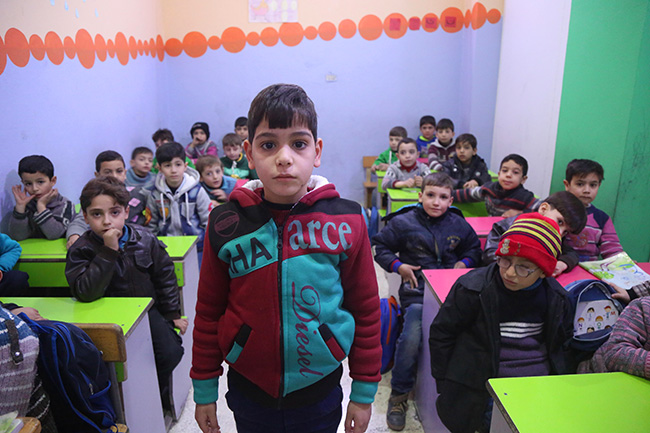Basement schools provide safety and vital continuity for Syrian children under siege
2017-03-14
©UNICEF/2016/Syria/Idleb/Omar Alwan

© UNICEF Syrian Arab Republic/2016/Alshami
A child stands near the exit stairs at the basement school. Basements across besieged areas of the Syrian Arab Republic have been transformed into underground schools to provide children with a safe space to learn.
By UNICEF Syrian Arab Republic
For Syrian children living in areas under siege, going to school can put their lives at risk. A growing number of basement schools are now providing children with a safe space to learn.
EAST GHOUTA, Syrian Arab Republic/ HONG KONG, 14 March 2017 – For some, the prospect of spending time underground in a dark, airless basement sounds dismal. But for children living under siege in the Syrian Arab Republic, basements offer shelter from the cold, a place to sleep, and a safe haven from violence. Basements across besieged areas have also been transformed into underground schools.
In East Ghouta, 200 children who had previously dropped out of school fearing attacks, displacement or injury are now attending a ‘basement school’.
>> Read the report: Hitting rock bottom: Children's suffering in Syria at its worst
“In our situation, basement schools are more practical and more successful than regular schools, which are often closed because of violence,” explains Lama*, one of the teachers. "It is very rare we aren’t able to open.”
Teachers do everything in their power to provide children with as normal a school setting as possible.
Children work together at desks while colourful paintings and cartoons adorn the walls. Basement schools provide a safer learning environment for children in besieged areas of Syria. They also offer vital continuity for children whose lives have been profoundly disrupted by the conflict.
“Every day we have an activity class. I draw flowers and colour them every day with my friends and it’s my favourite class because I love drawing so much,” says Batoul, 10, one of the children who attends the basement school in East Ghouta.

© UNICEF Syrian Arab Republic/2016/Alshami
Eight-year-old Mazen* dropped out of school after he witnessed a shell killing his other on his way back from school. “I became too scared to go to school and stopped going completely.” Mazen decided to come back to school when he learned that is was underground.

© UNICEF Syrian Arab Republic/2016/Alshami
Batoul, 10, colours on a piece of paper with her classmates. “Every day we have an activity class. I draw flowers and colour them every day with my friends and it’s my favourite class because I love drawing so much,” she says.
Mazen’s story isn’t uncommon. After six years of conflict in Syria, an estimated 1.75 million children are out of school. Children are forced to drop out of school because of displacement, poverty and the constant fear of attacks. In 2016, the UN documented over 308 attacks on education facilities and personnel in the Syrian Arab Republic, killing at least 69 children and injuring many more.
Education cannot wait for the conflict to end. UNICEF has scaled up its response to the meet growing education needs across Syria. In 2016 alone, UNICEF provided more than 3 million children with textbooks, school bags and stationery. UNICEF also supported the development of a condensed basic education curriculum called ‘Curriculum B’ for accelerated learning for children who have missed classes because of repeated displacement.
Back at the basement school, the air is filled with the ordinary sounds of children taking part in lessons under extraordinary circumstances. “It may not be the best learning environment,” explains Lama “but it is one of the safest options for children to continue their education.”
*names changed to protect identities









